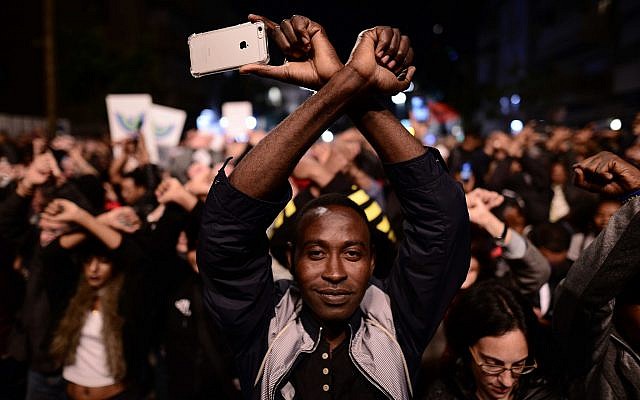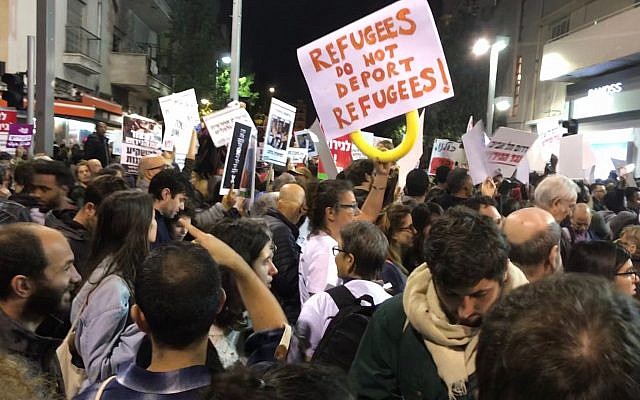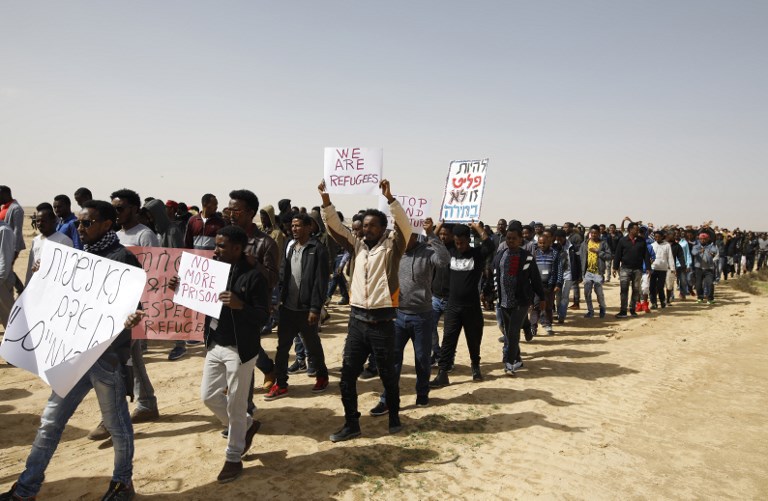Two men detained for questioning ahead of demonstration over Facebook posts calling for a violent counter-rally

More than 20,000 African asylum seekers and Israelis demonstrated next to the New Central Bus Station in south Tel Aviv on Saturday night, in protest of the government’s plan to deport the asylum seekers, which is set to begin in March.
“We didn’t choose to come to south Tel Aviv, they didn’t hand out maps to Levinsky Street in the Sinai desert,” Togod Omer, an asylum seeker from Darfur, Sudan, said as he addressed the thousands of people from the stage. “When we came, they gave us a one-way ticket to the new Central Bus Station.”
“We are all victims in this story, both the asylum seekers and the veteran Israelis,” Omer continued, in reference to those living in Tel Aviv’s southern neighborhoods. “We’re all living here together and they are always trying to get us to hate one another.”
Thousands of people filled Levinsky street chanting “the people demand a stop to the deportations!” with signs quoting Jewish texts about loving the stranger.
There are approximately 38,000 African asylum seekers in Israel, according to the Interior Ministry. About 72 percent are Eritrean and 20% are Sudanese. The vast majority arrived between 2006 and 2012. A law approved by the Knesset in December stipulates that the Interior Ministry will deport asylum seekers to Rwanda and Uganda starting in March.
“I’m happy that so many people came, and there are so many people who are helping us,” said Saleh, 24, an Eritrean asylum seeker who came from Haifa with a group of friends. “I’m a person just like everyone here is a person, and we all come from the same God.”
Many demonstrators said they were glad the protest was held in south Tel Aviv, even though the large turnout made it difficult to maneuver, as the intersection and surrounding streets were packed full of people.

“It’s nice to see black and white faces demonstrating together. When they have these protests at Habimah theater, it is very Ashkenazi,” said Gabi Doron, referring to the more popular location for protests in central Tel Aviv adjacent to Rothschild Boulevard. “This gives a feeling of standing together,” said Doron, a lifelong Tel Aviv resident who has been living in south Tel Aviv for 30 years.
“Now, I am not afraid of what will happen, because I can see so many Israelis are standing against the deportations,” said Awet Asheber, 37, an Eritrean asylum seeker who has been in Israel for 10 years. Asheber was protesting with other members of the Holot Theater, a drama group that was founded while they were in the Holot Detention Center. Today they perform around the country, telling the story of asylum seekers and what will happen to them if they are deported. “People here know that I am a refugee, not an infiltrator or an economic migrant like the state says,” Asheber said.
“I came from Holland 20 years ago and when I come here, I was really happy to see the faces from all over the world,” said Rona, a Dutch-Israeli demonstrator who came with three busloads of participants from Haifa. “Why can’t this be a true ingathering of exiles?” she asked.
About 150 counter-demonstrators were cordoned off to an area a block away from the main protest. They held signs that said “Liars, go home!” with pictures of planes, referring to the planned deportations.
“I was born and lived my whole life in the Shapira neighborhood, and we’ve been suffering from this violence for years,” said Reuven Mirayev, a lawyer. “I can’t go out at night, as soon as it gets dark, my daughters have to come home.”
On Saturday, ahead of the demonstration, Israeli police said they detained two men, one armed, after they allegedly made online threats to disrupt the rally.
It said the men were “detained for questioning,” after making a Facebook post apparently calling for a violent counter-protest as opponents of a government crackdown on the migrants gathered in Tel Aviv.
“Friends, it’s happening… the battle to throw out the infiltrators,” said the post, reproduced in a police statement. “It’s time to riot and defend our home.”
Police said comments posted in response to the Facebook entry included “I am armed.”
“Israel police immediately located the two suspects, detained them for questioning, and, at the conclusion, confiscated from one of the suspects his weapon,” the statement added.
Police were out in force and said they would not tolerate public disorder.
Israeli officials consider the vast majority of the nearly 40,000 African migrants to be job seekers, and say the country has no legal obligation to keep them. Israeli officials commonly refer to them as “infiltrators.”
The Africans, nearly all from dictatorial Eritrea and war-torn Sudan, say they fled for their lives and face renewed danger if they return. The vast majority arrived between 2006 and 2012.
People with open asylum applications cannot be deported before the applications are resolved. At this point, women and children are also not under threat of deportation.

n recent weeks, groups of Israeli pilots, doctors, writers, former ambassadors, and Holocaust survivors have appealed to Prime Minister Benjamin Netanyahu to halt the deportation plan, warning it was unethical and would cause grave damage to Israel’s self-described image as a light unto the nations.
Some American Jewish groups have also urged Israel to reconsider. Even Yad Vashem, Israel’s official Holocaust memorial, weighed in. While rejecting any comparisons between the plight of the migrants and the victims of the Holocaust, it said the issue is nonetheless a “national and international challenge that requires empathy, compassion, and mercy.”
Netanyahu said earlier this month, that “genuine refugees and their families will remain in Israel. We have no obligation to allow illegal labor migrants who are not refugees to remain here.”
A recent poll by the respected Israel Democracy Institute found two-thirds of the Jewish public agreed with the planned expulsions. The migrants’ best hope may be the government’s lack of preparation. Prison authorities are skeptical they will be able to process the 15,000 to 20,000 expected to be jailed. There are approximately 500 beds available in the Saharonim prison, the only prison that can accept asylum seekers who refuse deportation.
In 2012, an anti-migrant demonstration in Tel Aviv drew about 1,000 participants and descended into violence as crowds attacked African-run shops.
Saturday’s solidarity event was initiated by Israeli residents of Neve Shaanan, but organizers said they hoped that people would come from all over Israel to show support.
On Wednesday, hundreds of asylum-seekers at a detention center in southern Israel launched an open-ended hunger strike after several of them were transferred to prison in the Negev desert for refusing to leave the Jewish state voluntarily.
As reported by The Times of Israel
